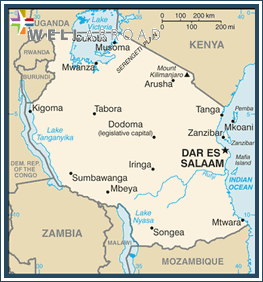|
MOST RECENT ALERTS
There's no recent alert.
|

|
|||||||||||||||
| COUNTRY OVERVIEW | ||||||||||||||||
|---|---|---|---|---|---|---|---|---|---|---|---|---|---|---|---|---|
|
| COUNTRY GENERAL INFORMATION | |||||||
|---|---|---|---|---|---|---|---|
| Language: |
Kiswahili or Swahili (official), Kiunguja (name for Swahili in Zanzibar), English (official, primary language of commerce, administration, and higher education), Arabic (widely spoken in Zanzibar), many local languages |
||||||
| Currency: | Tanzanian shilling (TZS) | ||||||
| Predominant Religions: |
mainland - Christian 30%, Muslim 35%, indigenous beliefs 35%; Zanzibar - more than 99% Muslim
|
||||||
| National Holidays: | Union Day (Tanganyika and Zanzibar), 26 April (1964) | ||||||
| Economic Status: |
Tanzania is one of the poorest countries in the world. The economy depends heavily on agriculture, which accounts for more than 40% of GDP, provides 85% of exports, and employs 80% of the work force. Topography and climatic conditions, however, limit cultivated crops to only 4% of the land area. |
||||||
| Security: |
Tanzanian People's Defense Force (Jeshi la Wananchi la Tanzania, JWTZ): Army, Naval Wing (includes Coast Guard), Air Defense Command (includes Air Wing), National Service |
||||||
| US Presence: |
U.S. Embassy in Dar es Salaam
686 Old Bagamoyo Road, Msasani Dar es Salaam, Tanzania Tel: 255-22-229-4000 |
||||||
| Document Requirements: |
A passport and visa are required for travel to Tanzania. US citizens with valid passports may obtain a visa either before arriving in Tanzania or at any port of entry staffed by immigration officials. The current fee for a visa has recently risen to $100 for a 12-month multiple-entry tourist visa to reciprocate the fee the United States charges visa applicants. This could rise again as the US application fee rises. Some border posts and embassies may have technical difficulty in producing the 12-month visa. They may make hand-written annotations on the computer printed visa. US passports should be valid for a minimum of six months beyond the date the visa is obtained, whether it is acquired beforehand or at the port of entry. Also, foreigners are required to show their passports when entering or exiting Zanzibar. |
||||||
| Major Airports: |
Airports: 124, Airports w/paved runways: 10
|
||||||
| Servicing Airlines: |
|
||||||
| Risks and Precautions: |
Crime is a serious problem in Tanzania, and visitors should be alert and cautious. Street crime in Dar es Salaam is common and includes mugging, vehicle theft, "smash and grab" attacks on vehicles, armed robbery, and burglary. Thieves and pickpockets on buses and trains steal from inattentive passengers. |
||||||
| Mortality Statistics: |
Infant MR total: 70.46 deaths/1,000 live births |
||||||
| Immunization Indicators: |
Required: None |
||||||
| Infectious Disease Concerns: |
degree of risk: very high |
||||||
| Overall Quality of Medical Services: |
Medical facilities are limited and medicines are sometimes unavailable, even in Dar es Salaam. There are hospitals on Zanzibar that can treat minor ailments. For any major medical problems, including dental work, travelers should consider obtaining medical treatment in Nairobi or South Africa where more advanced medical care is available. |
||||||
| Providers in Network: |
|
||||||
| Recent Medical Threats/ Concerns/Warnings: |
Polio outbreaks were reported in several previously polio-free countries in Central, Eastern, and Western Africa beginning in 2003. Polio is still endemic in Nigeria. Highly pathogenic avian influenza (H5N1) has been found in poultry populations in several countries in Africa. Avoid all direct contact with birds, including domestic poultry (such as chickens and ducks) and wild birds, and avoid places such as poultry farms and bird markets where live birds are raised or kept. For a current list of countries reporting outbreaks of H5N1 among poultry and/or wild birds, view updates from the World Organization for Animal Health (OIE), and for total numbers of confirmed human cases of H5N1 virus by country see the World Health Organization (WHO) Avian Influenza website. |
||||||
| Communications Info: |
Calling Code: +255 |
||||||






